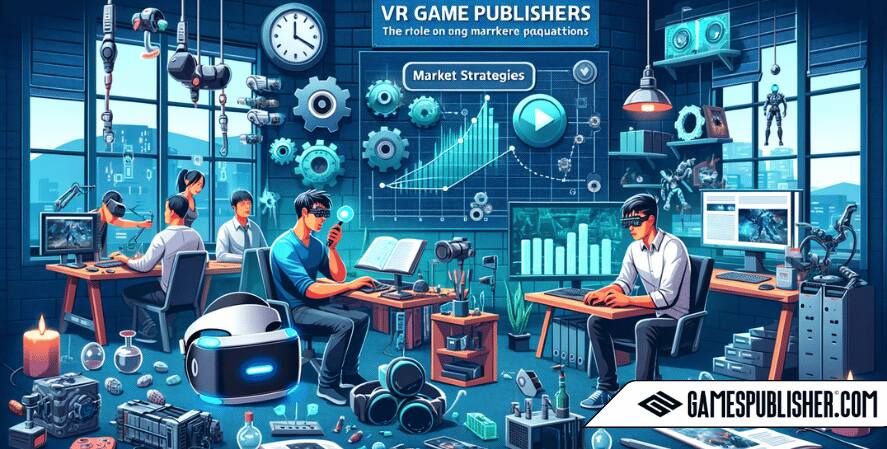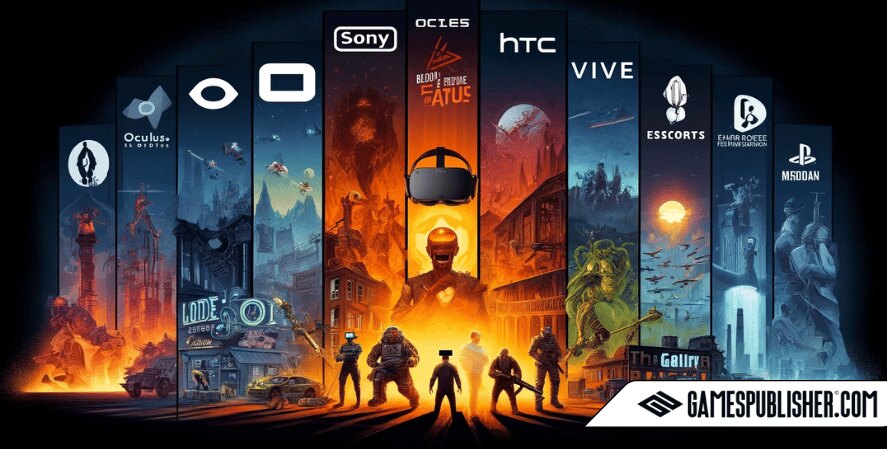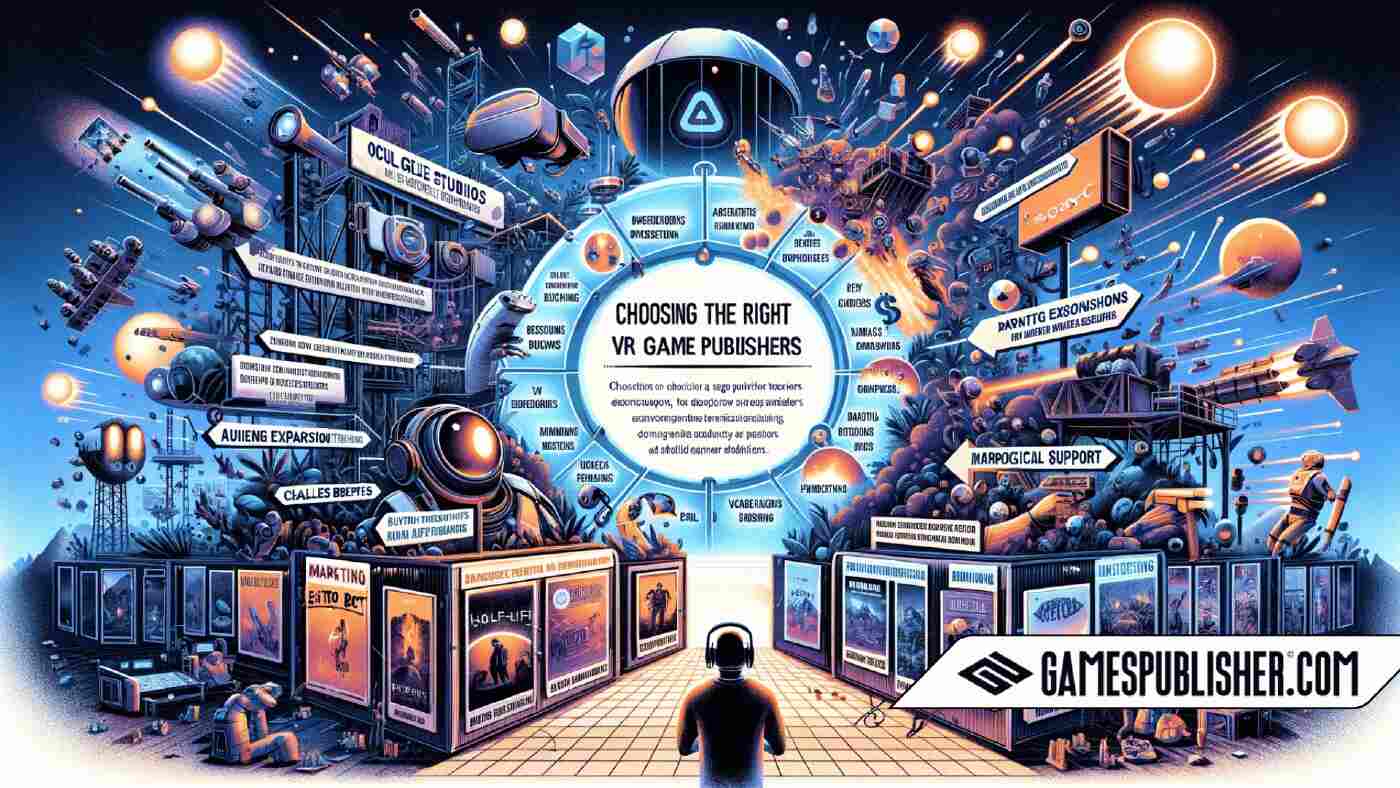In the ever-evolving world of gaming, virtual reality (VR) games have emerged as a revolutionary force, offering immersive experiences that were once the stuff of science fiction. As VR technology continues to advance, the role of VR game publishers becomes increasingly crucial in bringing these innovative games to a broader audience.
One such platform dedicated to connecting developers with the right publishers is Gamespublisher.com. This article delves into the significance of choosing the right VR game publisher and how these partnerships can propel a VR game to new heights of success.
The Role of VR Game Publishers

What Do VR Game Publishers Do?
VR game publishers play a pivotal role in the gaming ecosystem by bridging the gap between developers and the market.
Unlike traditional game publishers, VR publishers often face unique challenges, including ensuring compatibility with various VR hardware, understanding a niche market demographic, and enhancing the immersive experience that VR games promise.
Challenges and Opportunities
Publishing VR games comes with its set of challenges. These include high hardware requirements, a relatively smaller but rapidly growing market, and the necessity of creating deeply immersive experiences that can captivate players.
However, these challenges also present opportunities. With the right support, VR games can offer unparalleled experiences, leading to higher user engagement and satisfaction.
Key Benefits of Partnering with a VR Game Publisher

Audience Expansion
One of the most significant advantages of partnering with a VR game publisher is audience expansion. Publishers have established networks and platforms that can introduce a game to a global audience. They leverage their connections with various distribution platforms, ensuring that a game reaches as many potential players as possible.
Marketing and Promotion
VR game publishers often have sophisticated marketing strategies and promotional efforts tailored to the unique aspects of VR games. From social media campaigns to influencer partnerships, these strategies can significantly boost a game’s visibility and attract a dedicated player base.
Funding and Investment
Developing a VR game can be financially demanding. Publishers can offer much-needed financial support, reducing the burden on developers to self-fund their projects. This support can cover various aspects of development, from initial production to post-launch updates and expansions.
Technical Support
Technical assistance is another critical benefit provided by VR game publishers. They can help optimize a game for different VR sets, ensuring a smooth and enjoyable experience for players.
Additionally, publishers often provide ongoing post-launch support, addressing any technical issues that may arise and implementing updates to enhance the game.
Top VR Game Publishers

Leading VR Game Publishers
Several publishers have made a name for themselves in the VR gaming industry, each bringing unique strengths and notable titles to the market. Here are a few leading VR game publishers:
- Oculus Studios
- Notable Titles: “Lone Echo,” “Stormland“
- Strengths: Backed by Facebook (now Meta), Oculus Studios has substantial resources and a strong focus on pushing the boundaries of VR technology.
- Sony Interactive Entertainment
- Notable Titles: “Astro Bot Rescue Mission,” “Blood & Truth“
- Strengths: With the PlayStation VR platform, Sony offers extensive reach and robust marketing capabilities.
- HTC Vive Studios
- Notable Titles: “Superhot VR,” “The Gallery“
- Strengths: Known for its high-quality VR hardware, HTC Vive Studios also excels in creating and promoting immersive VR experiences.
- Valve Corporation
- Notable Titles: “Half-Life: Alyx,” “The Lab“
- Strengths: Valve’s expertise in game development and its powerful Steam platform provide a significant advantage in distributing and promoting VR games.
Publisher Strengths and Unique Offerings
Each of these publishers brings unique offerings to the table. For example, Oculus Studios’ integration with the Meta ecosystem ensures access to cutting-edge VR technology and extensive resources. Sony Interactive Entertainment’s robust marketing and expansive user base on the PlayStation platform can significantly boost a game’s visibility and sales.
HTC Vive Studios’ focus on high-quality VR experiences ensures that games published under its banner are well-optimized and immersive. Valve Corporation’s powerful distribution platform, Steam, offers unparalleled reach and promotional opportunities.
How to Choose the Right VR Game Publisher

Criteria for Selecting a Publisher
Choosing the right publisher is crucial for the success of a VR game. Here are some criteria to consider:
- Market Reach: Assess the publisher’s ability to distribute your game to a broad and relevant audience.
- Previous Partnerships: Look into the publisher’s history of partnerships and their success rates.
- Alignment with Vision: Ensure that the publisher’s goals and vision align with your own, maintaining the integrity of your game’s concept.
Understanding Contractual Terms and Creative Control
It’s essential to thoroughly understand the contractual terms offered by a publisher. Pay close attention to aspects like revenue sharing, rights to intellectual property, and the level of creative control you retain. A good publisher will offer a fair deal that supports your creative vision while providing the necessary resources for success.
Case Studies: Successful VR Games and Their Publishers

Case Study 1: “Half-Life: Alyx” and Valve Corporation
“Half-Life: Alyx,” developed by Valve Corporation, is a prime example of a successful VR game that benefitted from the right publishing partnership. Valve not only developed but also published the game, leveraging its Steam platform for distribution.
The game received widespread acclaim for its innovative use of VR, immersive gameplay, and high production quality. Valve’s strong reputation and extensive reach through Steam were critical in making “Half-Life: Alyx” a landmark VR title.
Case Study 2: “Astro Bot Rescue Mission” and Sony Interactive Entertainment
Another successful VR game is “Astro Bot Rescue Mission,” published by Sony Interactive Entertainment. As a PlayStation VR exclusive, the game showcased the potential of VR on the PlayStation platform. Sony’s robust marketing efforts and the game’s exceptional design and execution contributed to its critical and commercial success.
Conclusion
In the dynamic world of VR gaming, choosing the right publisher can make all the difference. Publishers not only provide financial and technical support but also significantly enhance a game’s reach and visibility. By partnering with a publisher that aligns with their vision and goals, VR game developers can maximize their game’s potential and connect with a broader audience.
For VR game developers looking to explore publishing opportunities, platforms like Gamespublisher.com offer invaluable resources and connections. As the VR gaming industry continues to grow, the importance of strategic publishing partnerships will only become more pronounced. Whether you’re a seasoned developer or just starting in the world of VR, the right publisher can help turn your vision into a reality.

